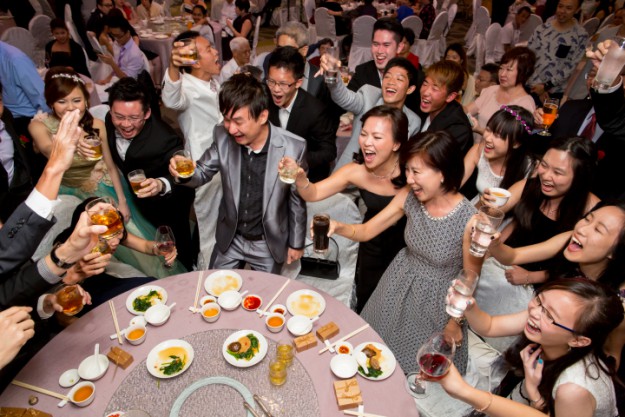Chinese Weddings: What to know as guests?
Not a single clue on what to expect at your first Chinese wedding? Just follow our guide and we reckon you’ll never commit a social faux pas!
So you’ve just got your first invitation to a friend’s wedding and it’s this weekend. You know the address, the date and you’ve even RSVP-ed. But what’s next? You’ve got no idea what to wear or how much you should give, and you’re officially starting to panic.
Well, take a deep breath, calm down and read on as we answer some of your burning questions because like most wedding ceremonies, it’s all about celebrating the union of two lovebirds. Perhaps the only difference here would be that Chinese weddings are marked with customs and carries its own traditions – unlike any other ethnic weddings we’ve seen.
What's the difference between the tea ceremony and wedding banquet?
Don’t get confused between the two because they’re essentially not the same. Chinese weddings first start off with a tea ceremony in the morning, followed by a dinner banquet in the evening – all of which happens in the same day.
The tea ceremony involves both bride and groom serving tea to honour and respect their seniors. The parents or elders would then graciously accept the tea to show how they have welcomed their new son or daughter-in-law, and reward them with ang baos (red packet) as a blessing for good fortune. This is first done at the bride’s home, followed by the groom’s and is normally attended by close friends and relatives.
Moments before a couple heads to their wedding banquet, there would be a change in outfits. Expect to see the bride donning the most stunning gown you’ve ever laid eyes upon, and the groom in a handsome suit. The newlyweds’ parents would then walk the couple through every table to introduce and get them acquainted with distant relatives and friends.
How many people will there be?
It depends if the wedding is held at a restaurant or a hotel ballroom. The latter is usually the more common option amongst couples, so you can easily expect about 200 to 300 people, who are immediate family and friends and colleagues of the bride and groom.
What type of food will be served?
At least an eight course dinner consisting of famous Chinese delicacies (think abalone, roasted duck and lobsters). Also, you’ll find that after attending a fair share of these weddings, some of the dishes served are the same and here's why. The Mandarin translation of these dishes hold a special meaning - they embody blessings of either happiness, prosperity or fertility for the couple and their marriage.
What colours should I avoid wearing?
Black and white are considered to be a symbol of death and mourning, so it’s best to steer away from them. Also, red is deemed a lucky colour and the bride has to wear it at some point of the wedding banquet. Unless you want to find yourself stealing the bride’s thunder, we say go for vibrant spring shades instead - pink, orange or green are your best bet.
What gift do I get?
Boxed gifts are customary for some weddings, but if you would like to offer one, make sure you're aware of the taboos. Majority of the Chinese are superstitious and big believers of unlucky homonyms. Think twice if you’d like to gift them with items like fans (which would be akin to the curse of seperation because its mandarin translation sounds like the word ‘disperse’) and clocks (which symbolises death). To avoid offending the happy couple, stick to ang baos (red packet) that typically come in red and gold, signifying longevity and a blessed marriage.
How much should I give in an ang bao?
Any amount makes for an excellent gift. However, avoid numbers that start or end with 4 (i.e. SGD4, SGD40, SGD400, SGD404) at all costs as the mandarin translation of the words ‘four’ and ‘death’ are a pair of homonyms. On the contrary, numbers 8 and 9 are auspicious as they represent fortune. Keep in mind to apply the rule to other gifts as well. Eight sets of dinner ware? Perfect!
Don’t make a toast without the words “Yam Seng” or “Gan Bei”
After every wedding speech, a toast will be made to the bride and groom to wish them a happy marriage. Similar to the term “cheers”, it is said that the louder you say these words and the longer you drag them, the longer and more blissful the couple's marriage will be. So don’t be afraid to shout these magic words as loud as you can.
At the end of the day, these rules are not set in stone so it's best to ask in advance if there are any customs they would like their guests to respect. But other than that, go on and eat your heart out, toast loud and dance, because there’s no better way to show your excitement for the happy couple than to thoroughly enjoy the occasion!
Jinghui Lee
Photo: Synchronal Photography




